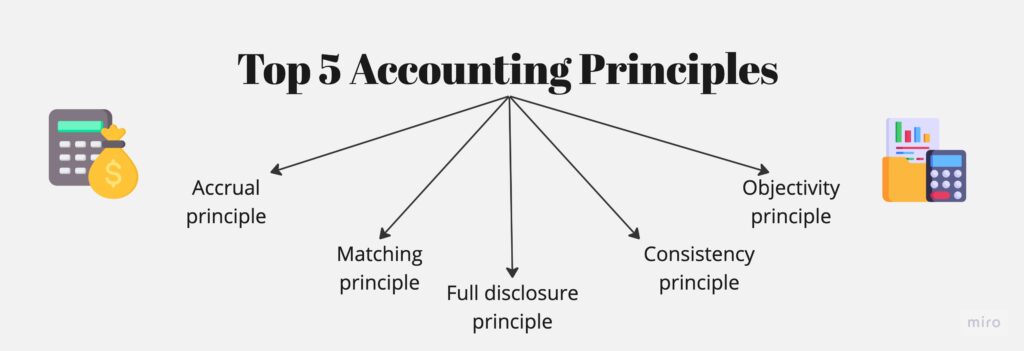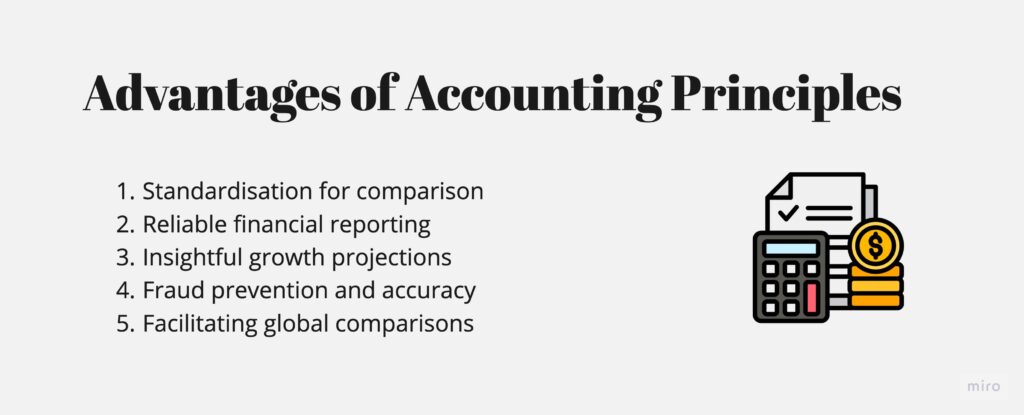Financial data needs to be classified and recorded in accordance with certain accounting principles, rules and regulations. This aids in better financial visibility and decision-making.
Globally, GAAP (Generally Accepted Accounting Principles) establishes accounting guidelines and regulations to classify and present financial data. Read on to learn more about accounting principles.
You will Learn About:
What are accounting principles?

Accounting principles are the rules and procedures that businesses and other entities must adhere to when reporting financial data and information. Typically, accounting principles are based on underlying concepts and assumptions and provide a framework for classifying and interpreting financial data based on GAAP.
They are important because they help maintain accurate and consistent accounting records and aid all stakeholders in making informed decisions.
Accounting Principles – Quick Highlights!
- Accounting principles, based on GAAP, are a set of rules that govern the preparation and reporting of financial data.
- The main advantage of accounting principles is that they provide a solid framework for preparing accurate, consistent and error-free accounting data. This helps stakeholders compare financial data over the years and other companies.
- Accounting principles can be misinterpreted, as different accounting principles may be read and applied differently.
- Accounting principles are important because they help record financial data accurately and aid legal compliance.
- The main difference between accounting principles and concepts is that principles are specific sets of regulations, whereas concepts are underlying assumptions that, in turn, guide accounting principles.
Importance of accounting principles
There are several reasons why accounting principles are important when recording financial data.
- As mentioned above, by using set rules, accounting principles can help record consistent, standardised and accurate data. This helps stakeholders compare financial performance over the years and with different companies.
- Accounting principles can help detect errors, increasing the accuracy of the data recorded.
- Accounting principles can also ensure that the data recorded is in compliance with the law of the country and can be used in case of legal issues or actions.
Top 5 accounting principles

Accounting principles decrease the chances of inconsistencies and help create error-free financial statements and reports. Below are a few basic accounting principles:
- Accrual principle
This principle states that accounting transactions should be recorded in the periods in which they occurred rather than the periods in which the cash flows were earned. This helps create accurate financial statements and accounts rightfully for expenses and revenue.
- Matching principle
This principle states that if a corporation recognises and records revenue, it should document all associated expenditures and expenses. For instance, if goods are sold in a certain period, their associated costs will also have to be recorded in the same period.
- Full disclosure principle
According to this principle, financial records and statements must disclose all relevant and vital financial information without any concealment. Essentially, this principle views financial statements as conveying information, not concealing it.
- Consistency principle
According to this principle, companies should continue to use a particular method of accounting until a better method of recording data is available. This helps maintain consistency in accounting data.
- Objectivity principle
According to this principle, all financial statements and data presented should be verifiable and free from personal biases. In other words, every single transaction recorded should be backed by appropriate claims and proof.
Essential features of accounting principles
A few critical factors of accounting principles are listed below:
- GAAP based rules
Accounting principles are based on GAAP – Generally Accepted Accounting Principles. GAAP, followed by the majority of US companies, establishes certain rules and standards that are required to be adhered to when reporting financial data.
- Comparison
Accounting principles that have set standards help provide a base for reasonable and accurate comparisons between different companies.
- Objectivity
Accounting principles provide objectivity. These principles remove any biases and make ground for accurately recording information (If a principle can be easily affected by biases, it is not an objective principle, and its utility is limited).
- Feasibility
The accounting concepts must be feasible and consistent. Additionally, the principles must be simple and easy to interpret.
Advantages of accounting principles

Here are some advantages of accounting principles –
- Accounting principles help provide a standard framework for preparing and reporting financial data. This can help investors, creditors, and other stakeholders compare the financial performance of different companies and businesses.
- Accounting principles ensure that the financial reporting of data is clear, reliable and accurate. This can aid decision-making.
- Accounting principles can help stakeholders make company growth projections by analysing trends and patterns observed in presented data.
- Accounting principles can help prevent fraud and data discrepancies. As these principles work on set standards, they minimise irregularities and data mismanagement.
- As accounting principles are set in line with international standards, they can aid the comparison of companies with international standards and businesses and can be used to identify cross-border investment opportunities.
Limitations of accounting principles
Accounting principles can be subject to interpretation. The reason for this can be the nature of business activities, management’s approach and more. Also, different accountants in the same industry may use different principles to interpret the same set of data. The inferences drawn may vary as well.
Furthermore, accounting principles do not consider all aspects of a company’s functioning. For instance, it cannot report on the changes in the business environment that a company operates in or other international and domestic happenings.
Differences between accounting principles and accounting concepts
Below mentioned are a few differences between accounting principles and concepts:
| Accounting principles | Accounting concepts |
| Accounting principles are advanced and refined versions of accounting concepts. | Accounting concepts are basic assumptions of underlying accounting principles. |
| They follow unique techniques for reporting financial facts. | It is involved with the upkeep of accounts. |
| Accounting principles are better organised and scientifically founded. | When preparing financial statements, theoretical concepts are used. |
| Accounting principles are concerned with accurately presenting a company’s financial data. | Accounting concepts are concerned with the accurate recording of transactions and accounts. |
Conclusion
Accounting principles are the standards and rules businesses use for recording and presenting financial data. A corporation is required to prepare financial statements based on GAAP, to present a fair and accurate picture of its financial standing. These principles help create standardised and error-free accounting data. Using these standard accounting principles, you can understand a firm’s actual financial position.
FAQs
Did you Like the Explanation?
Authored By:
I'm a Senior Content Writer at Tickertape. With over 5 years of experience in the financial industry and insatiable curiosity, I bring complex financial topics to life in a way anyone can understand. My passion for educating others shines through in my approachable writing style.



